
U.S. Republican presidential candidate former Massachusetts Governor Mitt Romney pauses while delivering an address titled, “Faith in America” at the George Bush Presidential Library in College Station, Texas December 6, 2007. REUTERS/Jessica Rinaldi (UNITED STATES)
As the price of private education has spiraled out of reach for more and more families, students have increasingly turned to public education. However, even public education costs. The upcoming presidential election this November, like every modern presidential election, will affect the finances of millions of college students. This makes it critically important to see what the candidates propose. Are there major differences between the candidates? The short answer is Yes.
Former Massachusetts governor Mitt Romney, the current GOP frontrunner, has an exhaustive set of policy proposals for jobs and economic growth, very carefully written and laid out for maximum psychological impact. The majority of his plans to improve the economy involve cutting taxes, especially on the “job creators,” people who for the most part have not actually created new jobs over the past decade. Clearly Mr. Romney thinks we need four more years of this. The document does not list an education policy, instead putting education under the umbrella of “human capital.” Instead, he talks about “retraining workers” and “conservative principles,” which in practice translates to the government paying to retrain workers.
I don’t disagree with all of his policy proposals. I like his proposals that raise student visa limits, or offer citizenship to foreign nationals who earn a math or hard science “advanced degree” from a US university. However, he does not discuss how people currently in college in the US will pay for their education, nor address crushing student debt–and given current worries about finding jobs after college, this is a serious lack. Mr. Romney has thought about the subject, but he has ignored the ramifications of his proposals.
Representative Ron Paul has made a much stronger showing than he has in any previous primary cycle. Dr. Paul, unlike Mr. Romney, does not have an exhaustive set of policy proposals. Instead, his proposal is simple: eliminate the Department of Education entirely. This would end the Pell Grant program, end current direct government loans to college students, and likely end the work-study program as we know it.
He does not propose any replacements for these programs, nor talk about training workers or teaching people. He would put all savings toward reducing the federal deficit. Over 4,700 UMB students received Pell Grants to pay for school last year; the school could face a huge enrollment drop if just the Pell Grants went away. This would be good for improved access to parking spaces and the cafeteria, but bad for almost everything else, including educational quality.
President Obama, unlike his two top challengers, has an education platform. He has doubled federal investments in Pell Grants, raising individual maximum awards by over $1,000 annually and adding another 3 million recipients. He reduced interest rates on student loans, meaning more students can afford higher education. He worked to properly fund K-12 education, meaning more people will be ready for college when they finish high school. He provided extra funding to community colleges, where many UMB students transition from.
According to a source close to the Obama campaign, who lacks standing to speak on the record, President Obama has a vision: to improve graduation rates in the US enough to bring us back to number one globally by 2020. He will, in short, work to expand on the educational successes of his first term.
Just looking at the approach of each candidate tells you about their view of college and university education. Ron Paul will gut the education system at all levels, devastating the engine of the American economy as well as the American dream. Mitt Romney treats education in terms of how it affects the bottom line of employers, treating most people as labor necessary for the profit margins of people at the top. Barack Obama looks at education as something worthwhile in and of itself, which has a meaningful impact beyond just a job.
Anybody who says only the educational aspect of education is worthwhile misses the larger picture. Training for work is as much a part of your education as nutrition is part of your meal; the rest of it–the flavor, the texture, the memories, the people–linger in your memory long after the experience itself is over. Many politicians got their start due to the networks they built in college while getting their education.
We have hopes and dreams of our own. Education plays a major role in how we will attain our goals. Think carefully about who you want to influence your education this fall.
U.S. President Barack Obama makes comments on the earthquake, tsunami and recovery efforts in Japan from the Rose Garden of the White House in Washington, DC, on Thursday, March 17, 2011. (Olivier Douliery/Abaca Press/MCT)

